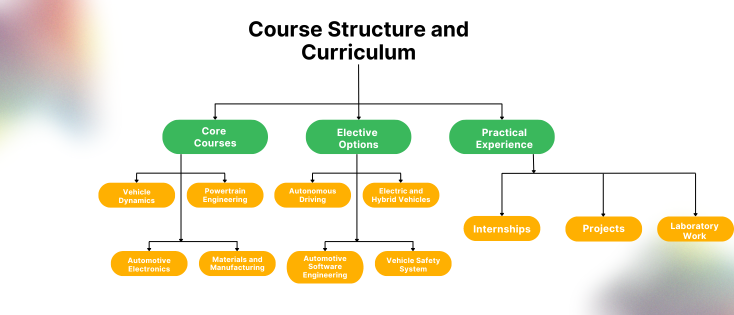With major automotive giants like BMW, Audi, Mercedes-Benz, and Volkswagen are headquartered in the country. Pursuing Masters in Automotive Engineering in Germany is a preferable for you. Taking a Master’s Degree in Automotive Engineering in Germany entails a blend of theoretical and practical components, forming an excellent basis for establishing a successful career in this rapidly developing world. Our main objective at Successcribe is to guide students along the whole procedure from when they apply until they complete their studies and thus will have an overall great experience while schooling in Germany.
Why Masters in Automotive Engineering in Germany?
Why pursue a masters in automotive engineering in Germany? There are several reasons why you should choose Germany for your masters degree in automotive engineering. The reasons are:
Global Industry Hub: Study in a country that is home to leading automobile legends like BMW, Audi, Porsche, and Mercedes-Benz.
Cutting Edge Research: Most modern laboratories and innovative technologies are available in the country. RWTH Aachen University boasts one of Europe’s largest automotive research centers.
Strong Industry Ties: Internship opportunities and industry projects in major automobile companies. For instance, TUM students have access to BMW’s research and development projects.
Quality of Education: Quality education is offered at a low cost—rigorous academic programs with an emphasis on practical training. Only the semester contribution fee is charged by the public universities in Germany. 9 Universities ranking in the global top 100 for engineering and technology.
Career Prospects: There is a huge demand for automobile engineers in Germany and other countries as well. The automotive industry contributes approximately €420 billion annually to the economy.
International Exposure: Germany is home to over 350,000 international students. Students experience diverse cultural environments and global perspectives.
Sustainable Technologies: Focus on the latest developments in electric and hybrid vehicle technologies. For Instance, Volkswagen plans to invest €35 billion in electric vehicles by 2025.
Course Structure For Automotive Engineering Students

Core Subjects
A typical Master’s degree course in Automotive Engineering in Germany encompasses a set of core subjects that are oriented toward providing a sufficient background and core knowledge in the field. These include:
Vehicle Dynamics: Understanding the motion and control of vehicles.
Powertrain Engineering: Studying the systems related to power generation and supply to the vehicle.
Automotive Electronics: Electronic system applied in the modern vehicle.
Materials and Manufacturing: Material applied in automotive construction; modern processes for manufacturing.
Elective Options
Students can further focus on themes of their interest and future careers by choosing a variety of elective modules. These include:
Autonomous Driving: Technologies and systems for self-driving cars.
Electric and Hybrid Vehicles: Designing and Development of Green Vehicles that are eco-friendly and Sustainable for the environment.
Automotive Software Engineering: Software Systems and applications in automotive design.
Vehicle Safety System: Advanced Safety technologies and their integration into vehicles.
Practical Experience
Practical Experience is the main component when learning something, it forms an essential part of the curriculum. Students participate in internships, live projects, and laboratory work. This includes:
Internships: Compulsory internships with top-notch automotive companies.
Projects: Live projects that are oriented towards solving real issues and challenges in the automotive industry.
Laboratory Work: Practical sessions on automotive systems and technologies.
Also Read: MS in Cyber Security in Germany
Admission Requirements
To get enrolled in Masters in automotive engineering in Germany, you need to meet some specific requirements. The basic requirements you need to fulfill are:
- Bachelor’s Degree: Relevant in automotive, mechanical, or related engineering fields.
- Minimum GPA: The minimum requirement is 75 % in your bachelor’s Degree.
- Language Proficiency
| English Taught Programs | TOEFL : 80-100 IELTS: 6.0 or above Duolingo English Test: minimum scores typically ranging from 105 to 125, depending on the university |
| German Taught Programs | TestDaf – TDN 4(minimum score of TDN 4 in all sections) DSH: DSH-2 Goethe Certificate: C1 or C2 levels are usually accepted. |
- Proof of Financial Means
Blocked Account: Approx. €11.208 per year or proof of scholarship.
- Application Documents
Transcripts and Degree Certificate
CV / Resume
Statement of Purpose
Letters of Recommendation
Language Proficiency Certificates
Passport Copy
Proof of Work Experience
Best Universities for Masters in Automotive Engineering
Here are some of the Top Universities offering Masters programs in Automotive Engineering, and known for their strong industry connections, high-quality education, and cutting-edge research facilities:
| Universities Name | Program Name | Specialization |
| Technische Universität München (TUM) | Master of Science in Automotive Engineering | Vehicle Dynamics, Powertrain Engineering, Automotive Software Engineering |
| RWTH Aachen University | Master of Science in Automotive Engineering | Vehicle Dynamics, Powertrain Engineering, Electric Vehicles |
| Karlsruhe Institute of Technology (KIT) | Master of Science in Automotive Engineering | Hybrid and Electric Vehicles, Vehicle Safety, Automated Driving |
| FH Aachen University | Masters in International Automotive Engineering | Vehicle Dynamics, Powertrain Engineering |
| Technische Universität Berlin (TU Berlin) | Master of Science in Automotive Engineering | Vehicle Engineering, Automotive Systems, Mobility and Transport |
| University of Stuttgart | Master of Science in Automotive Systems Engineering | Automotive Systems Engineering, Advanced Vehicle Technologies, Mechatronics |
| Hochschule für Angewandte Wissenschaften München (HM Hochschule München) | Master of Science in Automotive Engineering | Vehicle Systems, Advanced Driver Assistance Systems, Automotive Electronics |
| Darmstadt University of Technology (TU Darmstadt) | Master of Science in Automotive Engineering | Vehicle Dynamics, Automotive Electronics, Powertrain Engineering |
Cost of Living and Accommodation
The cost of living in Germany is relatively affordable when compared to other Western European countries. Typical expenses include:
| Expense Category | Detail | Monthly Cost (EUR) |
| Rent | Costs vary by city and type of accommodation Shared Flat (€300 – €500) Private Apartment (€500 – €700) | €300 – €700 |
| Utilities | It includes Electricity, Heating, Water, and Garbage. | 50 – €100 |
| Internet | Monthly Internet Subscription. | €20 – €40 |
| Groceries | Average cost for food and daily necessities. | €150 – €250 |
| Transportation | Public transport varies by city. | €70 – €100 |
| Health Insurance | Mandatory health insurance for students. | €80 – €120 |
| Study Material | Books, stationery, and other study-related expenses. | €20 – €50 |
| Miscellaneous | Includes leisure, clothing, and personal expenses. | €50 – €100 |
Masters in Automotive Engineering in Germany: In English
If you’re looking for a masters in automotive engineering in Germany in English. A Master’s in Automotive Engineering will be available in Germany, English-taught, and hence accessible to international students. Most programs are 2 years in length and include Vehicle Dynamics, Powertrain Engineering, and Electric Vehicles, among many other specializations. The best universities offering these courses include Technische Universität München, RWTH Aachen University, and Karlsruhe Institute of Technology. Students shall be admitted upon proof of a relevant Bachelor’s degree and proficiency in the English language through TOEFL/IELTS results. The graduating class can seek employment in design, research, and development opportunities with major automotive companies worldwide.
Average Salaries for Automotive Engineer in Germany
Below down are the job roles and their estimated salaries.
This is to be noted that salaries can vary by year of experience. The more experience an individual has the more salary they can expect.
| Job Role | Average Salary (annually) |
| Automotive Engineer | €55,000 – €150,000 |
| Powertrain Engineer | €65,000 – €85,000 |
| Vehicle Dynamics Specialist | €60,000 – €80,000 |
| Electric Vehicle Engineer | €65,000 – €85,000 |
| Automated Driving Systems Engineer | €70,000 – €95,000 |
| Automotive Design Engineer | €60,000 – €80,000 |
| Automotive Software Engineer | €60,000 – €80,000 |
| Research Scientist | €45,000 – €65,000 |
How Successcribe Can Help You?
At Successcribe, we assist and help in the full scope of services to take you through each step on your way to studying automotive engineering in Germany. They include the following:
Selection of University: We assist in the selection of the right university and program, keeping in mind your interests and goals for your career.
Application Assistance: Helping clients through the application process, ensuring the correct preparation of all documents, and timely submission.
Visa and Immigration Support: This involves assistance with visa applications, advice on compliance, and the requirements of the immigration law.
Pre-Departure Advice: Information on what to expect on arrival in Germany with regards to accommodation, healthcare, and banking.
Conclusion
Therefore, doing one’s Masters in Automotive Engineering in Germany provides the perfect opportunity to attain higher knowledge and skill levels in a country that has a highly developed automotive industry. It has world-class education, cutting-edge research, and strong collaboration with industry: very good opportunities awaiting successful careers in the field of Automotive Engineering.
Be it vehicle dynamics, power train engineering, or sustainable automotive technologies, the top universities in Germany offer a strong academic background as well as practical experiences to follow your ambitions. While you study in Germany, not only do you pursue excellent education, but you also live in a very dynamic and innovative automotive sector.
Related Post
Masters in Aerospace Engineering
Masters in Supply Chain Management
Masters in Management in Germany
Masters in Data Science in Germany












